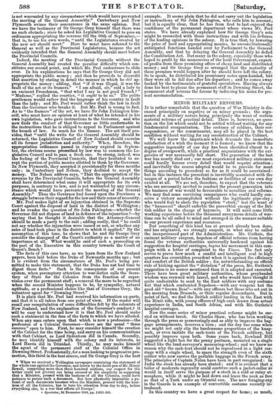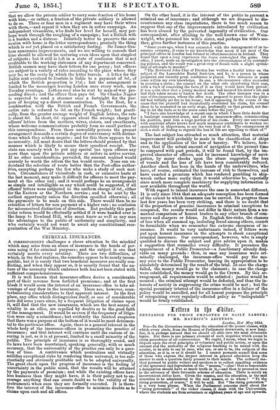MINOR MILITARY REFORMS.
IT is rather remarkable that the question of War Ministry is dis- cussed Principally on negative or on minor grounds ; the argu- ments of a military nature being principally the want of certain material reforms of practical detail. There is, however, no ques- tion on the list which could not be settled without waiting for any fundamental reorganization. The costume of soldiers, their cor- respondence, or the commissariat, may all be placed in the best condition without waiting for any reconstruction Of the Cabinet. We well know the impatience which demands the immediate satisfaction of a wish the moment it is formed ; we know that the suggestive ingenuity of our day has been cherished almost to a degree of overgrowth, while a practical acquaintance with the exi- gencies of war necessarily fall short. The generation of the last war has nearly died out ; our most experienced military statesmen could hardly foresee every detail that would require attention ; and inevitably the course adopted would be to provide for most things according to precedent so far as it could be ascertained : but in this instance the precedent is inevitably associated with the usages of a period before the fashions or facilities of our own day existed at all. We are not, therefore, to expect that the veterans who are necessarily invited to conduct the present generation into the business of war would be favourable to novelties and reforms. We may find some surviving campaigners who could hardly con- ceive a victory accomplished without the legitimate pipe-clay ; who would fear to abate the regulation "stock," lest the want of the " haussecol" should. enfeeble the proverbial energy of the Bri- tish soldier in the charge of bayonets. It will need some little working experience before the thousand anonymous details of war- time can be all called to mind and arranged in the manner suitable to our present experience and resources.
But something of this kind has at present already been done, and has originated, we strongly suspect, in what may be called the inexperienced part of the Administration. Mr. Guthrie, the eminent military surgeon, hopeless of official reforms from having found the veteran authorities universally hardened against his suggestion for hospital carriages, begins his movement in this cam- paign with a letter of complaint to the Times. The fact only serves to prove how much a candid and intelligent zeal in high. quarters has overridden precedent when it is against the efficiency and Comfort of the British soldier ; for, notwithstanding an official rule of kicking against the" dictation" of the press, Mr. Guthrie's suggestion is no sooner mentioned than it is adopted and executed. There have been great military authorities, whose greyheaded wisdom was crowned with laurel, and who would have thought it quite undesirable to send to the East soldiers with any costume but that which confronted Napoleon—with any weapons but the good old "brown Bess"—with any officers but those who set out in the morning from Brussels, or their regular descendants. But in point of fact, we find the British soldier landing in the East with the Mille rifle, with young officers of high rank drawn from actual experience in India, and South Africa, and with Mr. Guthrie's hospital-carriages.
Now the same series of minor practical reforms might be car- ried on without break. Sir Charles Shaw, who has been working through the press so perseveringly and so ably to improve the bag- gage arrangements, deserves a turn ; and the day has come when we might not only clip the burdensome proportions of the knap- sack, or even imitate the sack-tents of the French soldiery, but possibly improve upon both. Some years back, Rowland. Hill suggested a light box for the penny postman, mounted on a single wheel like the land-surveyor's measuring-wheel ; and we know no reason why the sack-tent should not be reproduced in a light car- riage with a single wheel, to spare the strength even of the sixth soldier who now carries the portable baggage in the French army. The principles of Captain Nolan have been in part recognized : India the stock has already been abated ; and it is evident that a tailor of moderate ingenuity could contrive such-a jacket-collar ti4 would in itself serve the purpose of a stock in a cold or rainy at- mosphere, while it might be laid down and leave the neck as free as that of a Turk under an Oriental sun. The new foraging-Cap in the Guards is an example of convertible costume recently in- troduced.
In this country we have a great respect for home; so much,
that we allow the private soldier to carry some fraction of his home with him,—or rather, a fraction of the private soldiery is allowed to do so. Three or four men in a regiment may have their wives with them,—and repent it when they are in active campaign. An independent vivandiere, who finds her level for herself, may per- haps work through the roughing of a campaign; but a British wife is a burden and a distress. Infinitely better to preserve the con- nexidn with home is the letter correspondence ; precisely the thing which is not yet placed on a satisfactory footing. Sir James Gra- ham announces improvements, and we are willing to concede that time should be allowed for maturing even ideas upon that simplest of subjects ; but it still is left in a state of confusion that is not creditable to the working statesmen of any department concerned. British seamen may have their letters for one penny; but officers are subject to a variety of rates according to the place where they may be, or the route by which the letter travels. A letter for the Baltic sent overland to Dantzic is liable to a payment of Sd., of which the British proportion is 3d.; but the arrangement is limited to the messenger leaving London once every week, upon Tuesday evenings. Letters may also be sent by man-of-war pro- ceeding direct ; and the officer then pays 6d. Sir Charles Napier is expected to send a steamer once a fortnight for the pur- pose of keeping up a direct communication. To the East, by a combination with the British and French Governments, the entire rate is reduced to 3d. on the French weight; but practi- cally, from the greater average weight of English letters, the rate is about 6d. In short, 6d. appears about the average charge for officers' letters from the mothers, wives, sisters, and sweethearts, whose welcome communications probably form no small portion of this correspondence. From those unworldly persons the present arrangement demands a certain degree of conversancy with distinc- tions which they seldom acquire ; and for this there appears to be no necessity. All must desire that the letters should proceed by that manner which is likely to secure their speediest receipt. The .state can scarcely wish to put any special tax upon officers any more than upon the private soldiers or sailors in active service. If no other considerations prevailed, the amount realized would scarcely be worth the odium the tax would create. None can un- derstand the selection of route better than the Post-office author- ities, excepting perhaps the few who make a study of such mat- ters. Circumstances of vicissitude in cash, or excessive haste at the last moment, may make it difficult for officers to meet the pay- ment at the other end ; and it would perhaps be an arrangement as simple and intelligible as any which °mild be suggested, if all officers' letters were subjected to the uniform charge of 6d., either for the Eastern or the Northern service ; and to be sent by the earliest_ opportunity unless the direction specified otherwise ; all _the_payments to be made on this side. There would then be no retention of letters for non-payment of a higher rate ; no confusion for misconceived distinction of direction. But probably this parti- eular reform Would be effectually settled if it were handed over in the lump to Rowland Hill, who must know SS well as any man the advantages to the public of uniformity and simplicity, and who certainly would not want to await any constitutional reor- ganization of the Wax Ministry.



































 Previous page
Previous page